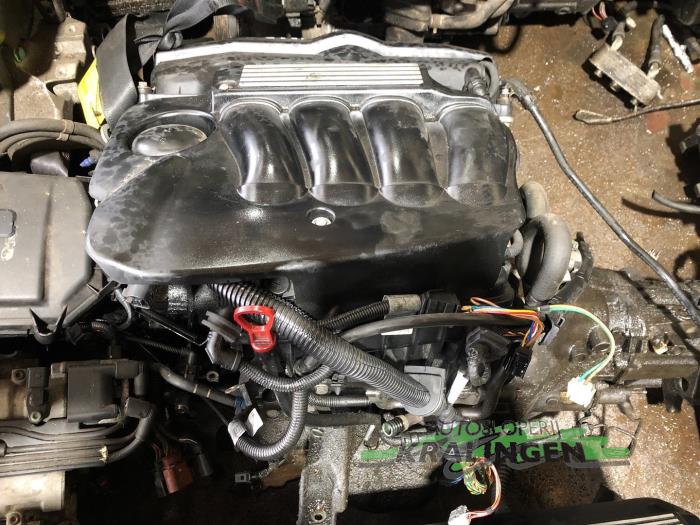The BMW 318ti: A Blend of Style, Convenience, and Efficiency
The BMW 318ti: A Blend of Style, Convenience, and Efficiency
Blog Article
Crucial Considerations for Choosing the very best Engine for Your Requirements
In the realm of choosing the perfect engine to satisfy your demands, numerous important variables demand precise factor to consider to make certain ideal performance and efficiency. From the nuanced equilibrium in between power and efficiency to the often-overlooked elements of maintenance and service demands, each aspect plays a pivotal role in identifying one of the most ideal engine for your specific demands. As the intricacy of engine modern technologies remains to evolve, critical the most suitable alternative requires a deep understanding of the interplay between different factors to consider. By exploring the intricate web of variables that underpin this decision-making process, a clearer course emerges towards choosing an engine that not just meets yet surpasses your assumptions.
Power and Performance
When evaluating engines for optimal performance, it is vital to focus on both power output and effectiveness. Power outcome measures the capability of an engine to create power, which straight impacts its performance. A high power output is important for demanding jobs such as heavy-duty applications or high-speed demands. It guarantees that the engine can handle the workload successfully and efficiently. Power alone is not sufficient; efficiency plays a substantial function in identifying the total performance of an engine. Effectiveness refers to just how well the engine converts gas right into usable power. A much more efficient engine will certainly provide better mileage, lower discharges, and lowered operating expense. Striking the right equilibrium in between power output and efficiency is crucial to selecting an engine that fulfills your details needs. When making this choice, it is necessary to consider factors such as the meant use of the engine, ecological influence, and long-term cost implications. By meticulously examining both power and effectiveness, you can pick an engine that delivers optimum efficiency and meets your demands effectively.
Fuel Efficiency and Economic Situation
In the realm of engine choice, the factor to consider of fuel efficiency and economic situation holds extremely important significance. Fuel effectiveness refers to the engine's ability to convert fuel right into power with minimal waste, directly influencing operating expense and ecological sustainability. bmw 318ti. When choosing an engine, assessing its gas economic climate is important to identify long-lasting savings and ecological influence. Engines with higher gas efficiency not just lower fuel expenditures but also lower carbon discharges, contributing to a greener operation.

Compatibility and Application
Considering the fuel performance and economy of an engine, the next crucial element to address is its compatibility and application within particular see this page operational contexts. Compatibility refers to how well the engine integrates with the general system or tools it powers. It involves elements such as physical measurements, placing choices, electric user interfaces, and control systems. Making sure compatibility is essential to prevent concerns such as getting too hot, resonances, or power inequalities (bmw 318ti).
Moreover, the application of the engine is just as essential. Different engines are developed for details purposes, whether it be industrial machinery, aquatic vessels, autos, or power generators. Recognizing the intended application permits for the option of an engine that can deliver the necessary power output, torque, and functional characteristics. For circumstances, a high-revving engine made for performance automobiles would certainly not appropriate for sturdy construction devices that calls for high torque at reduced speeds.
Upkeep and Solution Needs
Maintenance and service requirements play a crucial role in making certain the durability and optimum efficiency of an engine. Normal upkeep is important to avoid breakdowns, expand the life-span of the engine, and maintain its effectiveness. When picking an engine, it is essential to take into consideration the maker's suggested maintenance schedule and the availability of service facilities or certified technicians.
Aspects such as the frequency of oil modifications, filter substitutes, and total examinations can considerably affect the engine's efficiency. Some engines may need more regular maintenance based on their design and usage, while others might have longer intervals between upkeep checks. It is important to comply with these service requirements to prevent pricey repair work and unanticipated downtime.
Cost and Spending Plan Factors To Consider
Spending Source plan restraints commonly play a significant duty in the decision-making process when choosing an engine for a specific application. When taking into consideration the price and budget plan implications of selecting an engine, it is essential to analyze not just the first acquisition price yet additionally the long-term costs connected with upkeep, gas usage, and potential upgrades or fixings. It is critical to strike a balance in between the in advance expense of the engine and its total lifecycle expenses to make certain that the chosen engine stays economically lasting throughout its functional life-span.
Elements such as gas sturdiness, performance, and dependability can directly influence the complete price of ownership of an engine. While a much more expensive engine may have greater ahead of time expenses, it might potentially result in reduced upkeep and gas expenses over time, hence offering far better worth in the lengthy run.
Conclusion

Gas efficiency refers to the engine's capability to transform gas into energy click resources with marginal waste, straight impacting operating expenses and ecological sustainability.Variables influencing fuel effectiveness include engine layout, burning efficiency, and overall performance optimization. In addition, picking the appropriate fuel kind and quality as suggested by the engine producer can further enhance performance and lengthen engine life expectancy.
Engines with good utility functions and readily available parts can minimize upkeep prices and minimize the time the engine is out of operation - bmw 318ti. It is vital to strike an equilibrium in between the ahead of time cost of the engine and its overall lifecycle costs to guarantee that the chosen engine remains economically sustainable throughout its operational lifespan
Report this page